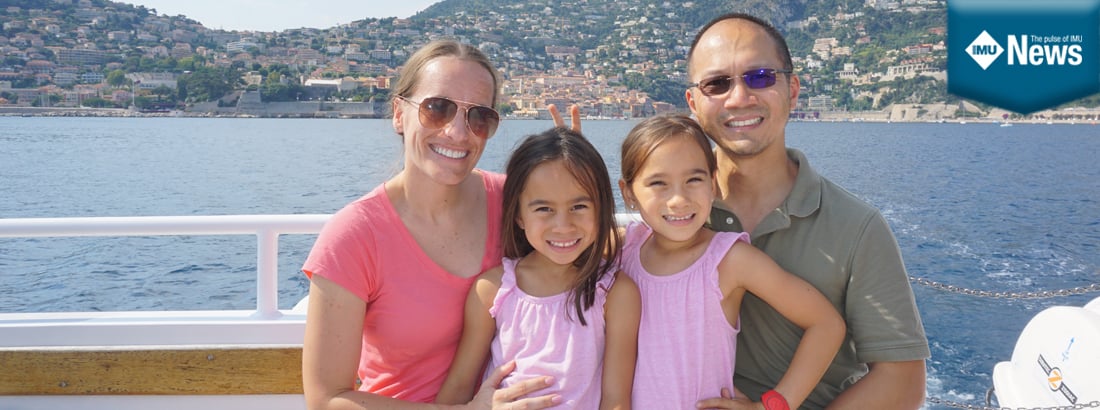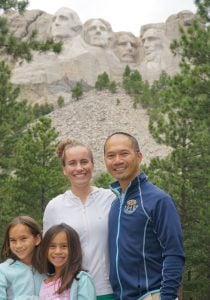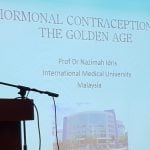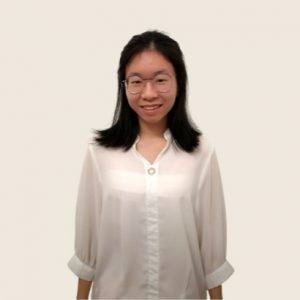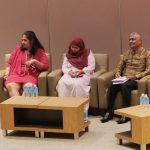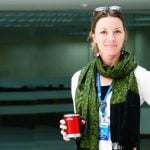IMU takes pride in its global alumni family and will always be ready to welcome back its members to the University. In September 2019, an IMU Alumnus, Dr Khoo Teck Kim returned to the University and spent some time in sharing updates on diabetes and review the new devices with our current students. We managed to catch up with him and interview him during his time back in Malaysia. Here is what he has to say about his journey as a doctor.
| Why did you pick IMU, and how was the 2 ½ years you spent there? |
|---|
| IMC (it was not yet a university – IMU) was the only private medical college then; having done my Cambridge A-Levels, local universities were not an option, so this provided an alternative, which was cheaper than studying medicine abroad for the entire duration of the course. In the few years at IMC, we forged friendships, which remain strong to this day despite my friends and I living on different continents. It was not all work; we had a good mix of fun and mischievous deeds young college students are known for, with countless hours of work and studying in the library and small group learning (SGL) rooms. One of the most memorable moments at IMU includes the IMU Cup and the festivities, including the wild opening ceremony of the games! |
| Looking back, how was the transition from IMU to the University of Calgary in Canada? How did you overcome challenges you faced there? What do you miss being in North America? |
| Culturally, it was a shock for a small-town Seremban boy moving to Calgary, Canada. However, I had supportive IMC seniors and there were 9 other Malaysians in my class so that made it easier. We also had awesome Canadian classmates who were very warm and welcoming to us which made the move much more bearable. There is also a huge difference in mind-set- in Asia, we seem to be preoccupied with getting the answers right; while in North America, the emphasis is on problem-solving, discussions, sharing ideas never mind if the answer is incorrect. So it was a certainly a huge change moving from a Malaysian lecture hall to that in Canada. Learning to function in a different social environment, whilst consuming food one is not used to, and living in a much colder climate – plenty of challenges! Ultimately, you just have to use grit and determination to overcome this, but thankfully I had very supportive friends, family and classmates. What I miss most is the Malaysian food, and the people – the crazy Malaysian English and the accents/slangs we use. |
| Describe your clinical and research experience at the Mayo Clinic, Rochester during your years of residency and fellowship training. |
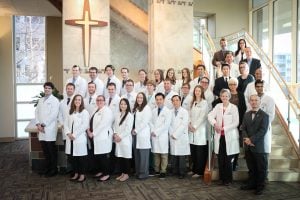 It was a wonderful 6 years and certainly a privilege and honor being able to train there for my residency and fellowship. Mayo Clinic is currently ranked #1 in the USA, and it was amazing to be training in a huge institution at the cutting edge of medicine, working alongside world-famous professors who are so enthusiastic about teaching. I had the opportunity to see what modern medicine when administered right, can do to humanity. I had several publications in the area of diabetes, though my main research during fellowship was related to Graves’ disease. I spent a year working in the lab of Dr Rebecca Bahn, performing tissue culture experiments and looking at factors involved in the pathogenesis of Graves’ ophthalmopathy. It was a wonderful 6 years and certainly a privilege and honor being able to train there for my residency and fellowship. Mayo Clinic is currently ranked #1 in the USA, and it was amazing to be training in a huge institution at the cutting edge of medicine, working alongside world-famous professors who are so enthusiastic about teaching. I had the opportunity to see what modern medicine when administered right, can do to humanity. I had several publications in the area of diabetes, though my main research during fellowship was related to Graves’ disease. I spent a year working in the lab of Dr Rebecca Bahn, performing tissue culture experiments and looking at factors involved in the pathogenesis of Graves’ ophthalmopathy. |
| How did you end up picking endocrinology as a specialty? |
| I had (and still do) a strong interest in physiology so naturally, it was leading me to either endocrinology or nephrology. We make decisions about specialisation in the second year of residency, so I just happened to do my endocrine rotation before nephrology and so here we are. Who knows, if I had done my nephrology rotation first, I might have been a nephrologist today! |
| Being on faculty at the Des Moines University and working with medical students and resident doctors, what are the new experiences and challenges you face? |
| One challenge all medical educators face in this era is the modernisation of education, with the use of laptops, videos etc. So one issue I m not a fan of is how students easily become detached, from the classroom and from the patients, watching lectures from the comfort of their own home and not being as engaged. |
| What words of wisdom would you impart to aspiring students taking this path? |
| My advice for all medical graduates is to take their time, and do not rush into career choices. The mistake many makes is to be set on a specialty or job long before they have had any true experience in the field, only to find out after they’ve invested years into education, that it is not what they thought it would be. Keep an open mind, get a feel for what medicine is like, and then let your passion and interest lead you down the path you were destined to take. |
| Share with us your typical work day. |
| I start my day at 7:30am and end about 4:00pm in the clinic, seeing mainly patients with diabetes (Types 1 and 2) but also a mix of patients with thyroid, adrenal and other endocrine disorders. Because this is an ambulatory specialty, I do not usually see patients in the hospital though we take turns being on call for a week every month during which I may do rounds in one of the 4 hospitals to which my clinic is affiliated. I perform thyroid sonography and if needed, biopsies of thyroid nodules. I also manage patients with continuous glucose monitoring systems and insulin pumps, and are currently the only center in the state of Iowa that performs the Eversense CGMS implantations (which is an implanted glucose sensor). Some days I have a resident doctor working with me which allows for teaching and academic discussions. |
We would like to express our heartfelt thanks to Dr Khoo for taking time out to answer our questions. IMU is very proud of his work and his passion in the medical field. We wish him all the best in his career. Related article: IMU Alumnus is Endocrinologist and Metabolism Specialist in Iowa, USA




